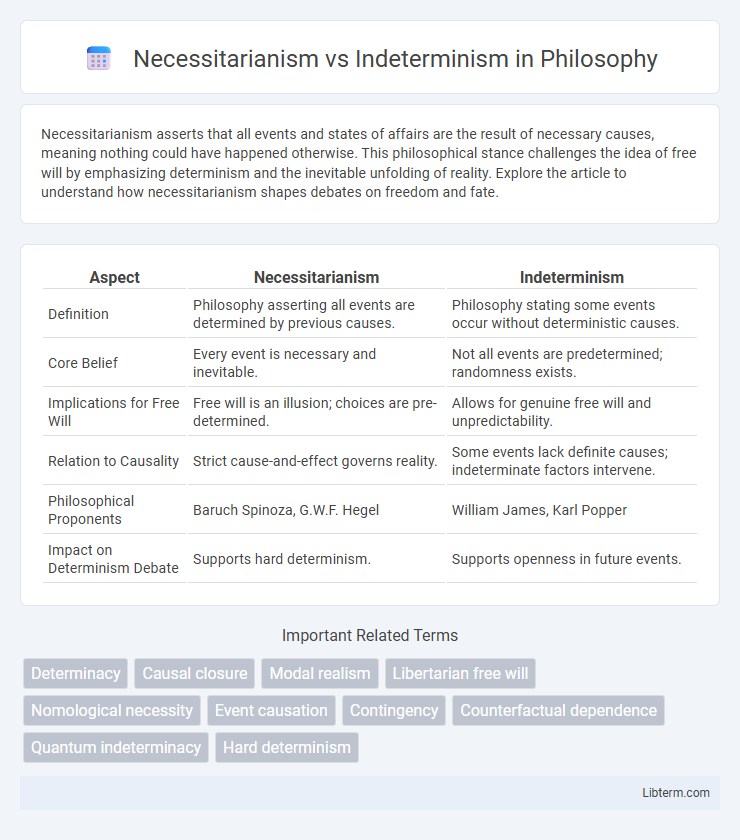Necessitarianism asserts that all events and states of affairs are the result of necessary causes, meaning nothing could have happened otherwise. This philosophical stance challenges the idea of free will by emphasizing determinism and the inevitable unfolding of reality. Explore the article to understand how necessitarianism shapes debates on freedom and fate.
Table of Comparison
| Aspect | Necessitarianism | Indeterminism |
|---|---|---|
| Definition | Philosophy asserting all events are determined by previous causes. | Philosophy stating some events occur without deterministic causes. |
| Core Belief | Every event is necessary and inevitable. | Not all events are predetermined; randomness exists. |
| Implications for Free Will | Free will is an illusion; choices are pre-determined. | Allows for genuine free will and unpredictability. |
| Relation to Causality | Strict cause-and-effect governs reality. | Some events lack definite causes; indeterminate factors intervene. |
| Philosophical Proponents | Baruch Spinoza, G.W.F. Hegel | William James, Karl Popper |
| Impact on Determinism Debate | Supports hard determinism. | Supports openness in future events. |
Introduction to Necessitarianism and Indeterminism
Necessitarianism asserts that every event or state of affairs is determined by preceding causes, embracing a deterministic framework where the laws of nature govern all phenomena with inevitability. Indeterminism challenges this notion by positing that not all events are causally determined, allowing for randomness or inherent unpredictability in the unfolding of reality. Understanding these perspectives is crucial for debates in metaphysics, philosophy of science, and free will, as they address the fundamental nature of causality and contingency.
Historical Foundations of Deterministic Thought
Necessitarianism roots back to ancient Greek philosophy, notably Aristotle's concept of causality, which emphasizes that every effect has a necessary cause. This deterministic perspective was further developed in the Enlightenment era by thinkers like Laplace, who proposed a clockwork universe governed by immutable natural laws. Contrastingly, Indeterminism emerged from challenges to classical mechanics, particularly with the advent of quantum theory in the 20th century, which introduced intrinsic randomness at fundamental physical levels.
Core Principles of Necessitarianism
Necessitarianism asserts that every event or state of affairs is the inevitable result of preceding causes governed by deterministic laws, leaving no room for alternative possibilities. This principle emphasizes causal determinism, where all occurrences are fixed and preordained by natural laws and initial conditions. Necessitarianism contrasts sharply with indeterminism, which posits that some events may occur without deterministic causation, introducing genuine randomness or probabilistic outcomes.
Defining Indeterminism: Key Concepts
Indeterminism posits that not all events are causally determined by preceding factors, allowing for genuine randomness or chance in the unfolding of events. Key concepts include quantum indeterminacy, where particle behavior cannot be precisely predicted, and philosophical arguments for agent causation, which support free will as an uncaused cause. This framework contrasts with necessitarianism by emphasizing unpredictability and multiple possible outcomes in the causal chain.
Philosophical Arguments for Necessitarianism
Philosophical arguments for necessitarianism emphasize the principle of causal determinism, asserting that every event is necessitated by preceding causes according to natural laws. Advocates argue that the coherence of scientific explanation and predictability relies on the assumption that all occurrences follow from prior states with necessity. This perspective challenges indeterminism by positing that genuine randomness or uncaused events would undermine the logical and metaphysical consistency of reality.
Philosophical Arguments for Indeterminism
Philosophical arguments for indeterminism emphasize the existence of genuine randomness and the openness of the future, challenging the deterministic claim that every event is causally determined by prior states. Indeterminism supports the notion of free will by arguing that agents can initiate actions independently of deterministic causal chains, often referencing quantum mechanics as empirical evidence of fundamental indeterminacy in physical processes. The debate centers on metaphysical freedom, where indeterminists assert that not all events are preordained, allowing for moral responsibility and creative spontaneity.
Implications for Free Will and Moral Responsibility
Necessitarianism asserts that every event is causally determined, which challenges the notion of free will by implying that individuals cannot act otherwise than they do, thereby questioning the basis for moral responsibility. Indeterminism allows for events, including human actions, to occur without deterministic cause, suggesting that individuals have genuine freedom to choose, which supports the attribution of moral responsibility. The debate affects how legal and ethical systems assign accountability, with necessitarian views potentially undermining blame and praise, while indeterminism upholds the possibility of autonomous decision-making.
Necessitarianism vs Indeterminism in Science
Necessitarianism in science asserts that every event is determined by prior causes governed by natural laws, emphasizing a predictable and deterministic universe. Indeterminism challenges this by proposing that some events, particularly at the quantum level, occur without predetermined causes, introducing fundamental randomness and unpredictability. This debate influences interpretations of quantum mechanics, such as the Copenhagen interpretation supporting indeterminism and deterministic views like Bohmian mechanics endorsing necessitarianism.
Critiques and Counterarguments
Necessitarianism faces critiques for its deterministic view that all events are predetermined by prior causes, limiting the scope of human free will and moral responsibility. Indeterminism counters by emphasizing the role of chance and randomness in events, but it struggles to explain how truly random occurrences can produce coherent and predictable outcomes. Critics of indeterminism argue that it risks undermining causality and rational explanation, while defenders maintain that it better accounts for autonomy and the unpredictability observed in quantum mechanics.
Conclusion: Reconciling Necessitarianism and Indeterminism
Reconciling necessitarianism and indeterminism involves recognizing that determinism governs macro-level physical laws while indeterminism operates at quantum or micro-level phenomena, suggesting a layered causality model. Embracing this duality allows a coherent framework where necessity applies to predictable, large-scale events, and indeterminacy accounts for probabilistic, small-scale occurrences, bridging philosophical and scientific perspectives. Such integration provides a comprehensive understanding of reality that respects both deterministic laws and inherent quantum uncertainties.
Necessitarianism Infographic

 libterm.com
libterm.com